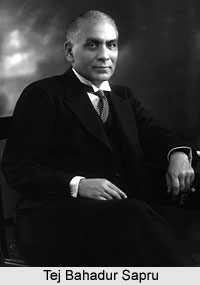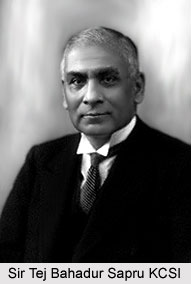 Tej Bahadur Sapru, also known as Sir Tej Bahadur Sapru KCSI, was a well known lawyer and a political leader during the rule of the British Empire in India. He was knighted by the British administration in the year 1922. Tej Bahadur Sapru was one of the most significant lawyers who were appointed to defend the arrested soldiers of the Azad Hind Fauj or the Indian National Army (INA). The Indian National Army was an armed force established under the leadership of Netaji Subhas Chandra Bose in the year 1942 by Indian nationalists in Southeast Asia during the Second World War. The main objective of the army was to attain Indian independence from the dominion of the British Empire in India, with the support of the Japanese Forces. Tej Bahadur Sapru worked as a lawyer in the Allahabad High Court. The eminent freedom fighter Purushottam Das Tandon worked as Sapru`s subordinate in there. Tej Bahadur was perhaps the best Hindu lawyer in British dominated India.
Tej Bahadur Sapru, also known as Sir Tej Bahadur Sapru KCSI, was a well known lawyer and a political leader during the rule of the British Empire in India. He was knighted by the British administration in the year 1922. Tej Bahadur Sapru was one of the most significant lawyers who were appointed to defend the arrested soldiers of the Azad Hind Fauj or the Indian National Army (INA). The Indian National Army was an armed force established under the leadership of Netaji Subhas Chandra Bose in the year 1942 by Indian nationalists in Southeast Asia during the Second World War. The main objective of the army was to attain Indian independence from the dominion of the British Empire in India, with the support of the Japanese Forces. Tej Bahadur Sapru worked as a lawyer in the Allahabad High Court. The eminent freedom fighter Purushottam Das Tandon worked as Sapru`s subordinate in there. Tej Bahadur was perhaps the best Hindu lawyer in British dominated India.
Early Life of Tej Bahadur Sapru
Tej Bahadur Sapru was born on 8th December 1875 in Aligarh, which is currently a district in the state of Uttar Pradesh, India. Tej Sapru was born to the parents Ambika Prasad Sapru and Gaura Hukku, in a Kashmiri Hindu family of the Sapru sub caste. He was the 8th cousin of Allama Iqbal. Sapru successfully completed his education at the Agra College.
Tej Bahadur Sapru in Indian Liberal Party
Sir Tej Bahadur Sapru was the leader of the Liberal Party of India and was a jurist. He preferred a dialogue with the British Government of India and sought for reformative actions related to self-government, however he did not aim to achieve independence from the British Empire. Along with other noted individuals such as M.R. Jayakar, Tej Sapru favored dialogue and discussions with the British administration. They also regularly participated in the provincial and central legislatures that were considered as rubber stamps of the Viceroy of India.
Political Career of Tej Bahadur Sapru
Tej Bahadur Sapru propagated the judicious policies of Gopal Krishna Gokhale after the massacre in Amritsar (also known as the Jallianwala Bagh massacre) in the Post-World War I period. He also criticized the leadership of Mahatma Gandhi and the denounced the Salt Satyagraha and the Non-Cooperation Movement. Sapru frequently acted as a mediator which aided him to negotiate the Gandhi Irwin Pact. It brought an end to the Salt Satyagraha. He also mediated in the Poona Pact and made an agreement between the British government of India, B.R. Ambedkar and Mahatma Gandhi. Tej Sapru also supported Britain and the decision of including British India in the Second World War.
Legislative Career of Tej Bahadur Sapru
 Tej Bahadur Sapru served in the United Provinces Legislative Council from the year 1913 to 1916). He also served in the Imperial Legislative Council from 1916 to 1920) and was also a law member of the Viceroy`s Council from 1920 to 1923. He actively participated in the Indian Round Table Conferences held during 1931 to 1933. Sapru served as an informal spokesman for liberal views in the first of these Conferences that was boycotted by the Indian National Congress. Tej Bahadur Sapru became a member of the Privy Council in the year 1934.
Tej Bahadur Sapru served in the United Provinces Legislative Council from the year 1913 to 1916). He also served in the Imperial Legislative Council from 1916 to 1920) and was also a law member of the Viceroy`s Council from 1920 to 1923. He actively participated in the Indian Round Table Conferences held during 1931 to 1933. Sapru served as an informal spokesman for liberal views in the first of these Conferences that was boycotted by the Indian National Congress. Tej Bahadur Sapru became a member of the Privy Council in the year 1934.
Tej Bahadur Sapru in Indian National Army Trial
Sir Tej Bahadur Sapru, along with Jawaharlal Nehru, Bhulabhai Desai, Kailash Nath Katju, Asaf Ali and others also defended the freedom fighters and officers of the Indian National Army in the INA trials at Red Fort in Delhi. Raja Habib Ur Rahman Khan, Colonel Prem Kumar Sahgal and General Shah Nawaz Khan and Colonel Gurbaksh Singh Dhillon were put on trial for waging war against the British Emperor on November 5, 1945. Sapru defended them and demanded that the soldiers of the Provisional Government of Free India should be treated as prisoners of war.
Personal Life of Tej Bahadur Sapru
Tej Bahadur Sapru and his wife had 2 daughters and 3 sons, namely Jagdembashwari, Bhuvaneshwari, Anand Narain, Trijugi Narain and Prakash Narain. Tej Sapru was the grandfather of Jagdish Narain Sapru. He died on 20th January 1949 in Allahabad.
Tej Bahadur Sapru was comparatively less popular in India due to his support to the British administration and opposition to Mahatma Gandhi and the Indian National Congress.



















